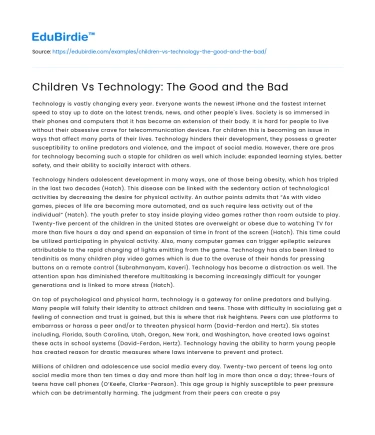Technology is vastly changing every year. Everyone wants the newest iPhone and the fastest Internet speed to stay up to date on the latest trends, news, and other people's lives. Society is so immersed in their phones and computers that it has become an extension of their body. It is hard for people to live without their obsessive crave for telecommunication devices. For children this is becoming an issue in ways that affect many parts of their lives. Technology hinders their development, they possess a greater susceptibility to online predators and violence, and the impact of social media. However, there are pros for technology becoming such a staple for children as well which include: expanded learning styles, better safety, and their ability to socially interact with others.
Technology hinders adolescent development in many ways, one of those being obesity, which has tripled in the last two decades (Hatch). This disease can be linked with the sedentary action of technological activities by decreasing the desire for physical activity. An author points admits that “As with video games, pieces of life are becoming more automated, and as such require less activity out of the individual” (Hatch). The youth prefer to stay inside playing video games rather than roam outside to play. Twenty-five percent of the children in the United States are overweight or obese due to watching TV for more than five hours a day and spend an expansion of time in front of the screen (Hatch). This time could be utilized participating in physical activity. Also, many computer games can trigger epileptic seizures attributable to the rapid changing of lights emitting from the game. Technology has also been linked to tendinitis as many children play video games which is due to the overuse of their hands for pressing buttons on a remote control (Subrahmanyam, Kaveri). Technology has become a distraction as well. The attention span has diminished therefore multitasking is becoming increasingly difficult for younger generations and is linked to more stress (Hatch).
Save your time!
We can take care of your essay
- Proper editing and formatting
- Free revision, title page, and bibliography
- Flexible prices and money-back guarantee
On top of psychological and physical harm, technology is a gateway for online predators and bullying. Many people will falsify their identity to attract children and teens. Those with difficulty in socializing get a feeling of connection and trust is gained, but this is where that risk heightens. Peers can use platforms to embarrass or harass a peer and/or to threaten physical harm (David-Ferdon and Hertz). Six states including, Florida, South Carolina, Utah, Oregon, New York, and Washington, have created laws against these acts in school systems (David-Ferdon, Hertz). Technology having the ability to harm young people has created reason for drastic measures where laws intervene to prevent and protect.
Millions of children and adolescence use social media every day. Twenty-two percent of teens log onto social media more than ten times a day and more than half log in more than once a day; three-fours of teens have cell phones (O’Keefe, Clarke-Pearson). This age group is highly susceptible to peer pressure which can be detrimentally harming. The judgment from their peers can create a psychological distortion of who they are, which in turn, leads to many issues: self-harm, eating disorders, anxiety, depression, isolation, and even suicide (O’Keefe, Clarke-Pearson). The vulnerability to these is only enhanced through social media interaction.
On the contrary, the benefits of technology on children are spectacular. Education and learning have been enhanced due to teaching websites and a vast assortment of information accessible anywhere. The ability to comprehend basic skills and absorb new information has expanded, because the structure of these processes is more interesting and interactive (Hatch). Furthermore, the authors of a clinical report share that: “Middle and high school students are using social media to connect with one another on homework and group projects. For example, Facebook and similar social media programs allow students to gather outside of class to collaborate and exchange ideas about assignments. Some school's successfully use blogs as teaching tools, which has the benefit of reinforcing skills in English, written expression, and creativity” (O’Keefe, Clarke-Pearson).
Young students’ standard for success is far more achievable with technology than without. On top of that, the job market has increased need for tech-savvy people. Preparing young people for the work force, regardless of how far in the future it is, is becoming greater and greater as today’s workforce becomes predominately technology dependent.
Many children have difficult communicating and making friends due to fear of judgement and lack of self-confidence. Technology through social media and instant messaging create a platform for talking with peers, without having the pressure of physical interaction. Dealing with bullies and issues with friends has become trouble-free with electronic media (Hatch). Lack of confidence and morale seem to boost dramatically when a screen replaces a physical interaction. Issues can be dealt with in a more effective manner, to not only help the user, but the person on the receiving end of a message.
While it would be impossible to keep children completely shielded from technology and lack beneficial reasoning, there should be restrictions.






 Stuck on your essay?
Stuck on your essay?

